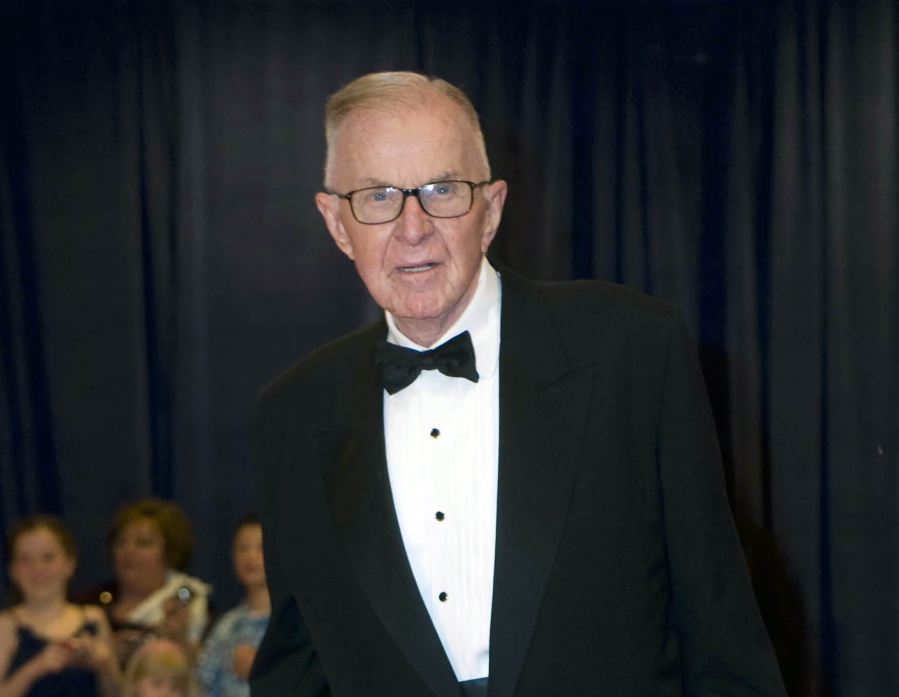The next time you go home for Thanksgiving and Uncle Joe sparks another intra-family argument about the damn Republicans/lousy Democrats/price of tea in China, John McLaughlin will be smiling wryly somewhere.
As much as anyone, McLaughlin, who died Tuesday at the age of 89, taught America how to argue about politics. Which is to say, with short, sharp jabs, and often at high volume. That incessant racket you hear all the time now about Trump, Clinton and what all? Some of that is McLaughlin’s legacy as the master of ceremonies for the family food fight known as “The McLaughlin Group.”
McLaughlin didn’t invent the political sparring on TV; “Face the Nation” did it politely back in TV’s Dark Ages and “Agronsky & Co.” was a syndicated forerunner. McLaughlin simply supercharged it, revving the engines to a satisfying din for a full 30 minutes.
Each week, McLaughlin presided over a panel of Washington nobodies — the Group — that snarled and hissed over the meat (“Issue No. 1!”) that McLaughlin tossed into the cage. The group’s setup guaranteed conflict and contrast: The original panel included conservatives Pat Buchanan and Robert Novak pitted against a reasonable moderate, Morton Kondracke, and a grumpy liberal, Jack Germond. McLaughlin, one of the few openly conservative TV hosts, moderated and scolded with a roaring, “Wrong!”
The details of the discussions on “The McLaughlin Group” weren’t nearly as important as the chemistry and the pacing. Unlike it gray competitors, “The Group” was as much about the speed of the discussion as the intensity. Under McLaughlin’s lash, the panel churned through multiple topics in minutes, establishing the modern standard.
McLaughlin taunted the panelists to elicit counter-opinions, and he demanded predictions — creating, in short, the kind of speculative, subjective conversations that political junkies and sports fans adore. Who cared whether all the guessing and opinion-mongering probably influenced no one and ultimately meant nothing but a good show?
And like a family, there was also an underlying sense that while the combatants disagreed, they didn’t dislike one another.
With the program’s mounting success through the 1980s and early 1990s, the nobodies who appeared on “The Group” started to become somebodies. Chris Matthews, a substitute panelist, eventually became the host of his own cable talk shows. Germond, who felt McLaughlin never fully appreciated the panelists, nevertheless saw his fame and speaking fees soar as a result of his appearances. After she joined the all-male panel in the late 1980s, Eleanor Clift was soon being stopped in airports by strangers eager to compliment her for standing up against the testosterone blasts that came her way each week. Buchanan used his “McLaughlin Group” fame as a springboard for his political career, which peaked with his victory in New Hampshire’s Republican primary in 1996.
Some critics, including Germond, were appalled by what the show had wrought. They thought it trafficked in superficiality and oversimplification, reducing complicated policy questions to a point-scoring exercise.
(The late and lovable Germond was as blunt about the show as he was on it. When asked by The Washington Post in 2000 why the show’s ratings were declining, he replied: “I’ve got no idea why people aren’t watching anymore. I never understood why people watched in the first place.” Including himself, he added: “Now, I don’t bother with it. Why should I irritate myself?”)
McLaughlin transcended his own narrow format when “Saturday Night Live” parodied “The McLaughlin Group” beginning in the 1990s. Dana Carvey, playing McLaughlin brilliantly, turned the volume up on McLaughlin’s gust-of-wind catchphrase — “Wrongggg!” — and invented nicknames for “The Group’s” role players (“Eleanor ‘Gee I Think You’re Swell-inor’ Clift!”).
The sketches delighted McLaughlin — “Wronggg!” became a national bon mot — but ultimately signaled its peak. Although “The McLaughlin Group” remains in syndication, its popularity began a slow and steady decline by the late 1990s. It was, in many ways, eaten by its own: Cable news networks, seeking cheap programming, filled hours with “McLaughlin”-style shoutfests involving compensated opinionistas.
McLaughlin’s children are everywhere. CNN, CNBC, MSNBC and Fox News Channel devote massive chunks of air time to animated, confrontational kibitzing. Add to this “The View,” Bill Maher’s show, and talk radio. Even hoary institutions such as “Meet the Press” contrive conversational scuffles.
The noise must sound like angels’ harps to John McLaughlin.



